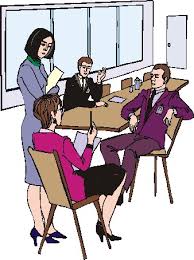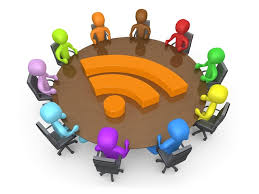Matt Cameron
and
Cheryl Azevedo Johnson
Santa Clara University
STUDIES ON CHARACTERISTICS
OF NEGATIVE MEETINGS
•
83% --
Drifting off the subject
•
77% --
Poor preparation
•
74% --
Questionable effectiveness
•
68% --
Lack of listening
•
62% --
Verbosity of participants
•
60% --
Length
•
51% --
Lack of participation
From “Achieving Effective Meetings
– Not Easy But Possible”
by Bradford D.
Smart in a survey of 635 executives.
WHAT ARE PEOPLE LOOKING FOR IN EFFECTIVE MEETINGS
•
88% --
allow all attendees to participate
•
66% --
define a meeting’s purpose
•
62% --
address each item on the agenda
•
59% --
assign follow up action
•
47% --
record discussion
•
46% --
invite only essential personnel
•
36% --
write an agenda w/time frames
Source: GM Consultants, Pittsburgh, 1993
PREPARATION FOR A MEETING
•
Define the
purpose of the meeting and the outcomes
•
Determine
who should be there
•
Reserve a room,
appropriate equipment
•
Decide on
appropriate set up
•
Develop an
agenda
•
Distribute
the agenda prior to the meeting
•
Inform
participants of any necessary preparation
MEETING TIPS
•
Take
meetings seriously and do real work
•
Don’t let
people digress from the topic
•
Outline
tasks and assign deadline so members know
how to follow-up
•
Consider
using technology to allow individuals to anonymously express opinions
•
Make sure
you have the information you need for decision making before the meeting starts
•
Keep good
records on what works and doesn’t work and include these in minutes
CONDUCTING MEETINGS
•
Start on
time
•
Review and
stick to the agenda
•
Volunteer or
assign minutes taker (if appropriate)
•
Assign and
agree on responsibilities and establish target dates for completion
•
Summarize
•
End on time
•
Send out
minutes or notes
•
HAVE SOME
FUN!!
TIPS TO DEAL WITH DIFFICULT MEMBERS
•
Listen, but
do not debate
•
Talk
privately with members who continually exhibit disruptive behaviors
•
Turn
negative behaviors into positive contributions
•
Encourage
the group to share the responsibility for handling difficult members
•
Don’t take
it personally
•
Try
different strategies, small groups/pairs
DISRUPTIVE BEHAVIOR
•
Coming in
late
•
Reward and
thank those who were there on time.
•
Argumentative
•
Keep temper
in check and model for group. Find some
merit in points made. Speak in private.
•
Side
Conversation
•
Avoid
sarcasm. Restate last comment made. Explain to group the need to hear information.
•
Losing Focus
•
Implement
“parking lot” for divergent ideas. Restate
purpose of discussion.
•
Griper
•
Point out
what can and can’t be changed. Ask group
for ideas on how to best operate.
•
Won’t Talk
•
Examine what
motivates them. Ask for their opinion.

No comments:
Post a Comment